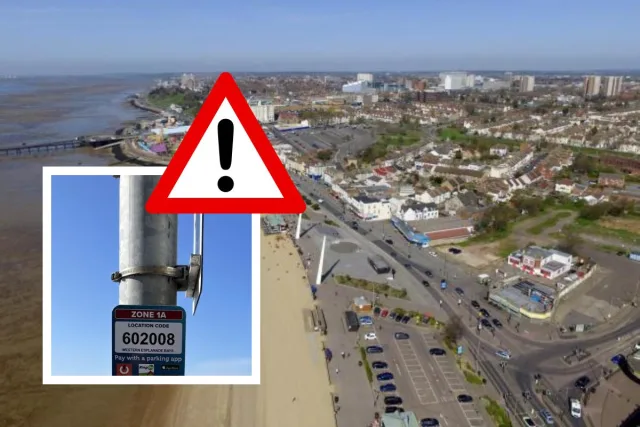**Quishing Warning as Scammers Target Parking Signs on Southend Seafront**
Southend-on-Sea, Essex – Authorities have issued a fresh warning to the public about a new scam trend emerging along the popular Southend seafront. Scammers are reportedly targeting parking signs in the area, employing a method known as “quishing” to steal personal and financial information from unsuspecting motorists. The scam, which has recently been brought to light by local law enforcement and consumer protection agencies, is a growing concern for both residents and visitors alike.
The fraudulent activity involves scammers altering parking signs by placing QR codes over the official codes already displayed on parking meters. These altered QR codes, when scanned, redirect users to fake websites designed to resemble legitimate parking payment portals. Once on these websites, unsuspecting individuals are prompted to input their personal details, including bank account information, under the pretense of paying for parking or extending their parking time.
Local police have stressed that the scam is highly deceptive due to the authentic appearance of the counterfeit QR codes and the websites they lead to. Many drivers may not realize they are being tricked until it is too late. The ease of scanning QR codes via smartphones has made this type of scam particularly effective, as it bypasses the need for individuals to physically interact with parking meters.
Authorities are urging all visitors to Southend’s seafront and other areas where QR codes are used for parking to be cautious when scanning any parking-related QR codes. Anyone who suspects that a sign or QR code has been tampered with should report it to the local council or police immediately. Local council members have promised swift action to address the issue, including inspecting all parking signs and removing any suspicious alterations.
This growing trend has prompted the introduction of new measures by the Southend Borough Council. In collaboration with local police and consumer protection bodies, the council has begun installing tamper-proof stickers on parking signs and QR codes. These stickers are designed to be easily identifiable and resistant to alteration. Additionally, drivers are being encouraged to use official mobile apps or the parking meters directly to avoid any risk associated with fraudulent QR codes.
Furthermore, experts have emphasized the importance of raising awareness about quishing and similar scams. Consumer protection groups have warned that scams like these are becoming more prevalent as cybercriminals exploit new technologies to deceive the public. They advise that drivers remain vigilant and check the legitimacy of websites they are directed to, looking out for signs of phishing, such as unusual URLs or requests for sensitive personal information.
The Southend-on-Sea Council is also running a public information campaign to educate locals and tourists about quishing. Flyers and digital messages are being distributed across the seafront, advising people on how to spot a tampered QR code and what actions to take if they become a victim. In addition, the campaign emphasizes that parking fees should never be paid through a link in an unsolicited email or text message.
As the quishing scam continues to evolve, experts suggest that parking authorities nationwide could benefit from revisiting their use of QR codes and online payment systems to better safeguard users. Meanwhile, Southend’s local authorities are committed to combating the issue, ensuring the safety of the community, and restoring public trust in parking systems throughout the area.
